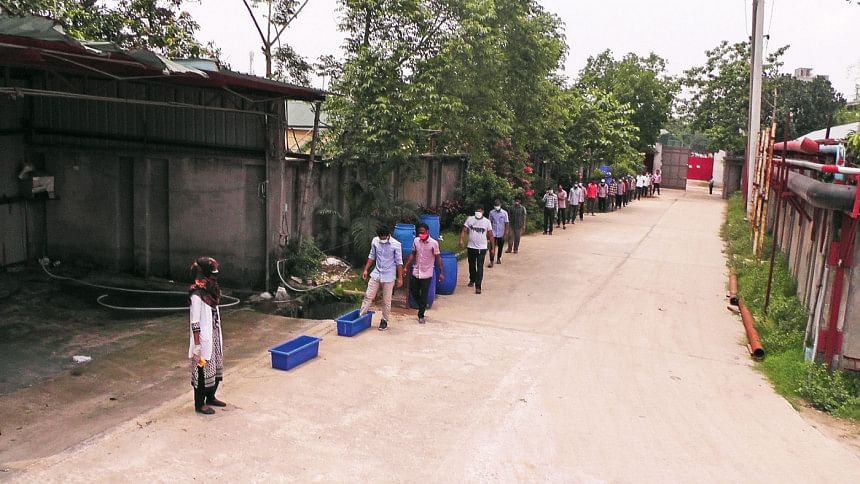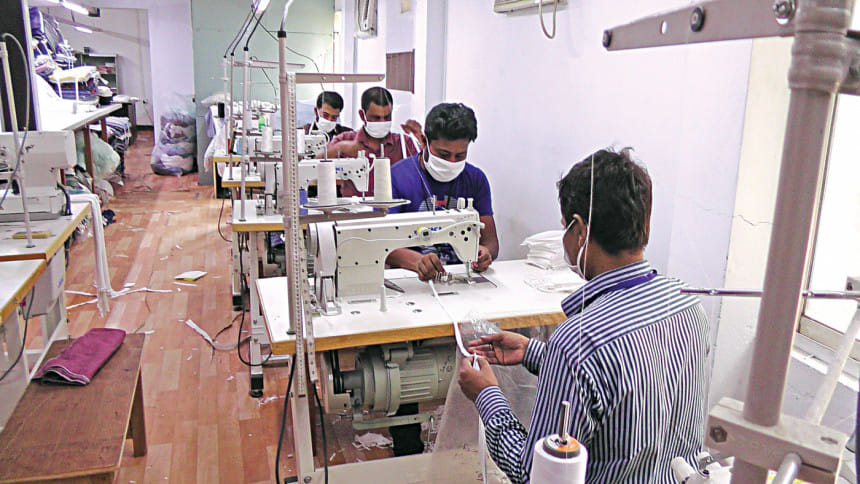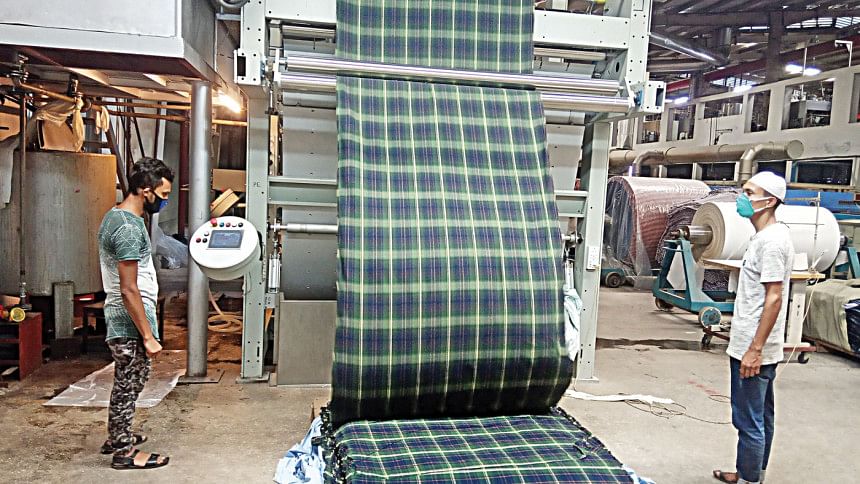Paramount Textile: a textile firm with a conscience

When workers enter Paramount Textile's plant in Sreepur, Gazipur, they would need to go through a temperature testing procedure using a thermal scanner, wash hands properly and disinfect their shoes.
Wearing hand gloves has also been ensured as part of strengthening safety measures and all the facilities that have been put in place by the owners of the company are not quite normal in the garment and textile industry in Bangladesh.
Weaving operator like Sazzad Hossain, who left Gazipur on March 26 after the government declared a countrywide general holiday, had to stay in 14 days quarantine after he returned to the factory. The facilities were too provided by the factory owners.
"After the mandatory quarantine, I joined the work on Sunday and we need to follow doctors' advice as well," said Hossain, who has been working at Paramount Textile for five years and seven months now.

His colleague Nazmul Haque, who lives adjacent to the plant, has got masks and three pieces of soaps and hand sanitisers from the factory to keep himself clean.
The same was provided for each of the company's 2,000 employees.
What is more, they have received much-needed advice from the doctors about hygiene, how to ensure safe distancing and improve immunity to keep the coronavirus at bay.
"The factory provides free medical check-up to my family members and some free medicines during usual times and now the facilities have been enhanced," Haque said.
The company's efforts are aimed at fighting the spread of the highly contagious COVID-19 as the government allowed reopening of some factories and industries subject to maintaining strict hygiene measures.
"We are looking at the spending needed for the facilities as capital expenditure," said Shakhawat Hossain Kollol, chairman of Paramount Textile.
Paramount has put in place a complete arrangement of coronavirus testing kits, medical facilities and equipment and clinical support containing oxygen.
Six doctors used to attend the employees even before the novel coronavirus hit the shores of Bangladesh and the medical facilities have been enhanced now to ensure additional care.
"Washing hands while entering the factory is a must. We have directed the workers to do it during the intervals and if they leave the machines even for a brief period during the shift," said factory in-charge AHM Abdur Rahman Hasnat.
The factory has set up 40 makeshift basins and put in place large water containers after the coronavirus situation worsened across the country.
Paramount Textile did not stop there. It brings in vegetables from Kurigram, which is at least 300km away from the plant and sells them among the workers at a price much lower than the rates in the kitchen markets in the locality.
"We are getting vegetables only at half prices than the local market," said Haque, who hails from Rajshahi. Rice is sold at Tk 30 to Tk 40 a kilogram depending on the variety.
Other essentials are also available inside the plant and workers can buy them cheaply.
The essentials are being sold at subsidised rates since the first coronavirus cases were reported in Bangladesh on March 8.

One particular incident prompted the recent change in Kollol. Recently, the entrepreneur came across a video clip of a weeping farmer as he could not find buyers for his produce.
The scene shocked him and the farmer seems to be known to him. At once, he decided to send a truck to the farmer and buy all of the vegetables in his disposal and sell them among the employees.
"I knew it will be win-win for both the farmer and my workers."
Later, Kollol recalled that the farmer had won a national award along with him in 2016. The entrepreneur has a farming venture that produces chemical-free vegetables, fish and livestock.
Bringing vegetables from the northern districts has become regular in the last one month.
"I love to see the smiling faces of my employees. I am quite sure we are getting return as our employee retention rate is higher than any other plants nearby," Kollol said.
Some of the workers live in the dormitories and most live in the adjacent areas and Paramount Textile's supervisors regularly make a visit to see where their workers live and in what condition so that they can extend as much assistance as possible.
Workers get wages and salaries even before the end of a month -- a rare case in Bangladesh's garments and textiles industry.
Because of the regular wage payment, Paramount Textile had faced the wrath of unidentified people in the past. These people might be from other factories that can't pay workers regularly, said an official of the company.
Paramount Textile was set up in 2006 and commenced commercial production in 2008 and most of the workers have been working since the very beginning.
Set up on five acres of land, it manufactures a diversified range of yarn and solid dyed woven fabrics.
"The plant has to run round the clock and there is no chance to switch off the plant. So, we ran it during the holidays on a limited scale," Kollol said.
The company also faces pressure from the international buyers, who have warned that if the company can't meet their demand, they would move orders to other factories.
"So, we have had to run our plants on a very limited scale," he said, adding that when the government declared the general holidays, about half of the workers had wanted to continue to work, while the other half went home.
The company's net profit after tax was Tk 41 crore in fiscal 2018-19, up from Tk 27 crore a year earlier, according to the company's financial statement.
A listed company, Paramount Textile gave 7 per cent cash and 9 per cent stock dividend to its shareholders last year.

 For all latest news, follow The Daily Star's Google News channel.
For all latest news, follow The Daily Star's Google News channel. 



Comments